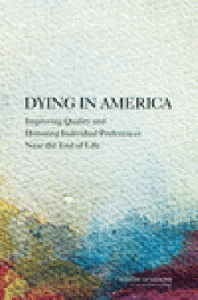DYING IN AMERICA
A few weeks ago the Institute of Medicine, the nonprofit, nongovernmental health arm of the National Academies of Science, released a 500 page report entitled “Dying in America.” A summary of the report is available here..
 A principal reason why patients undergo unwanted and ultimately expensive care at the very end of their lives is because too many of us fail to think and talk about – and then put in writing – our end-of-life wishes. The Report urges people to begin those conversations at an early age, and to continue talking about these issues throughout one’s life.
A principal reason why patients undergo unwanted and ultimately expensive care at the very end of their lives is because too many of us fail to think and talk about – and then put in writing – our end-of-life wishes. The Report urges people to begin those conversations at an early age, and to continue talking about these issues throughout one’s life.
At The Shore Law Firm, every conversation about “disability planning” includes a discussion of our clients’ end-of-life wishes. A Health Care Proxy gives someone the power to speak on your behalf and to make your health care decisions … but it does not tell your agent what to say. A Living Will (or otherwise titled Advance Directive) gives your agent the words you want them say on your behalf if/when a time comes when you are indeed at the end of your life and unable to express your wishes yourself. Although not legally sanctioned in Massachusetts (we have no statutory Living Will here as they do in some other states), this document can be the best gift you give to yourself and to your family. Without your guidance and input, your health care agents are, basically, winging it, trying to guess (and perhaps down the line second guessing) what you would want them to say.
There is no correct answer to “what would you like for yourself if your doctors have determined that your death is likely to occur in a short time?” Each of us may make different choices, based on our experiences, religions, backgrounds, cultures, and sometimes even on misinformation about the dying process. I find that the clients who have lived through the end of life of a parent or grandparent have the strongest feelings about what they want for themselves, but nearly everyone has at least some vague notion about what they would want/not want to happen to them even if they have not had any first hand experience with someone dying.
In our meetings, I often have the privilege of facilitating these thoughtful discussions between a husband and wife, between life partners, and between parents and their children. The majority of my clients conclude that if there is no chance of meaningful recovery, they do not want aggressive care and extraordinary measures. But several of my clients have told me and their loved ones that they want absolutely every intervention possible for as long as possible (I have actually named that version of my Living Will the “bring it on!” document). In each case, we commit their wishes to writing. And then we provide our clients with tools and resources to facilitate family discussions because having their wishes in writing is just the first step. Having ongoing conversations with their decision makers will empower the agents and help to ensure that everyone is on the same page when the time comes.
Is talking about dying a fun or easy time? Of course not. But it is the best way to make sure that our last days are as pleasant as possible, and that we save our families the heartbreak of wondering for years after we are gone “did I make the right choices?” Our decisions will also influence our choices of health care agents because we need to be sure to pick people who will speak for us as we would speak for ourselves. We encourage everyone to begin this conversation today, and welcome the opportunity to guide you and your family through this planning process. To get started, click on our Community Resources page, End of Life Planning tab for links to some important tools.